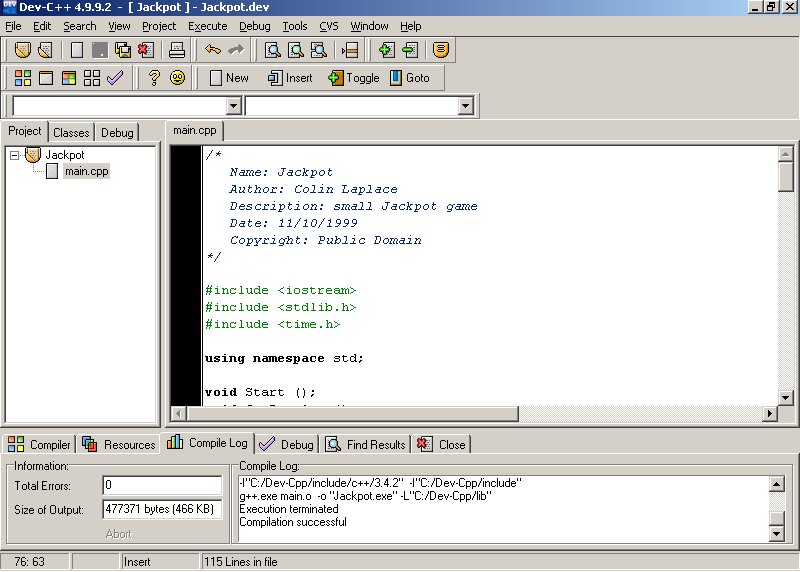C++ Image Processing Dev C++
- C++ Image Processing Course
- C Image Processing Dev C Online
- C Image Processing Dev C Software
- C Image Processing Dev C Free
Installation of OpenCV3 on Ubuntu:
C++ Image Processing Course
Jan 10, 2018 It's a C library with a bunch of machine learning and image processing tools. Also, unlike OpenCV, it's designed with modern C techniques (e.g. No pointers, appropriate use of templates and container classes, etc.), so it's pretty easy to use. I have a Canny Edge Detection Code written in C. I would like to know how can I make it more robust in terms of detecting all the edges correctly and save it? Image processing using Python OOP library. Image filter for gradient detection. What would be the downsides of having a “you break it, you fix it” policy in the dev. Mar 17, 2018 in this tutorial we will learn: - load an image - create an openCv window -display the image we code in c using codeblocks Business Inquiries email shafik. If you guys know any open source code in C that does image processing plz give me a link -OR- if any of you guys are already in the process or finished coding your own image processing maybe you can be nice to share me your source code and I'll see if I can modify to speed up execution time. Jun 24, 2014 This can be useful for selectively cutting off specified intensities in an image. Image Processing Filters. There are many filters that can be applied for different image processing functions. The convolve function (Convl.cpp) is used to apply 3 x 3 kernel (matrix) filters to the image. Jan 30, 2013 Low pass filters (blurring) in Image Processing using C. By Programming Techniques Published January 30, 2013 Updated January 30, 2019. Low pass filtering also called “blurring” & “smoothing” is very basic filtering operations in image processing. The simplest low-pass filter just calculates the average of a pixel.
The CImg Library is an image processing library, designed for C programmers. It provides useful classes and functions to load/save, display and process various types of images.
Step 1: Update packages
Step 2: Install OS libraries
C Image Processing Dev C Online
Step 3: Install Python libraries
Step 4: Download OpenCV and OpenCV_contrib
Step 4.1: Download opencv from Github


Step 4.2: Download opencv_contrib from Github
Step 5: Compile and install OpenCV with contrib modules
Step 5.1: Create a build directory
Step 5.2: Run CMake
Step 5.3: Compile and Install
Step 5.4: Create symlink in virtual environment
Depending upon Python version you have, paths would be different.OpenCV’s Python binary (cv2.so) can be installed either in directory site-packages or dist-packages.Use the following command to find out the correct location on your machine.
It should output paths similar to one of these (or two in case OpenCV was compiled for both Python2 and Python3):
Double check the exact path on your machine before running the following commands
Running OpenCV codes
In C++:
In python:
基本はpythonで組んで,画像処理アルゴリズムだけC++で書きたい用のサンプルコード
Point
- ctypesを使う
- Windows/LinuxでC++ファイルの作り方,呼び方が異なる.
- numpy配列をポインタ型にしてC++関数に渡せるが,numpyの型指定必須.
- .cppの関数は,'extern 'C' __declspec(dllexport)'つけないとpythonから外部参照できない
- ctypesポインタに変換した配列をnumpy配列にする方法はとりあえず,xrangeにした.
- Image_processing.pyから実行
DLLの作り方Tips
Windows OS
- Download https://sourceforge.net/projects/mingw-w64/files/Toolchains%20targetting%20Win64/Personal%20Builds/rubenvb/gcc-4.8-release/
- 'x86_64-w64-mingw32-gcc-4.8.0-win64_rubenvb.7z'
- Build Dll for Windows 64bit System.
- Reference https://kakurasan.blogspot.jp/2015/07/debianubuntu-mingw-crosscompile.html
- Command
x86_64-w64-mingw32-g++ -c Image_processing.cpp
x86_64-w64-mingw32-g++ -shared -o Image_processing.dll Image_processing.o
Linux OS
- Build .so for linux System.
- Command
g++ -g -Wall -fPIC -o Image_processing.o -c Image_processing.cpp
g++ -shared Image_processing.o -o Image_processing.so
C Image Processing Dev C Software
実行結果
C Image Processing Dev C Free
python .Image_processing.py(array([10, 20, 30], dtype=uint8), array([40, 50, 60], dtype=uint8), array([10, 20, 30, 40, 50, 60, 70, 80, 90], dtype=uint8), array([0, 0, 0, 0, 0, 0, 0, 0, 0], dtype=uint8))(<main.LP_c_ubyte object at 0x000000000210FBC8>, <main.LP_c_ubyte object at 0x0000000002A12A48>, <main.LP_c_ubyte object at 0x0000000002AB0AC8>, <main.LP_c_ubyte object at 0x0000000002B548C8>)210[11 21 31 41 51 61 71 81 91]